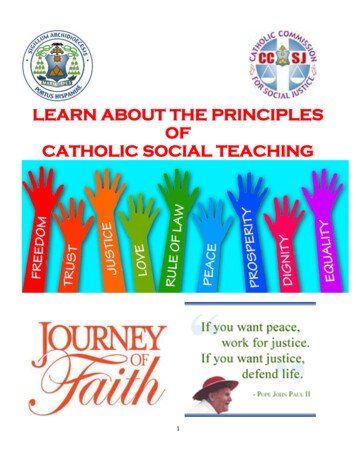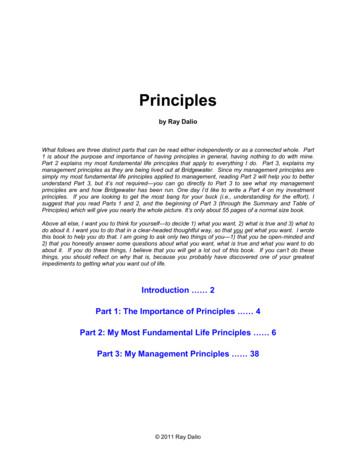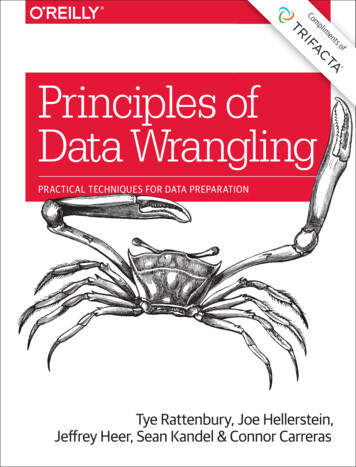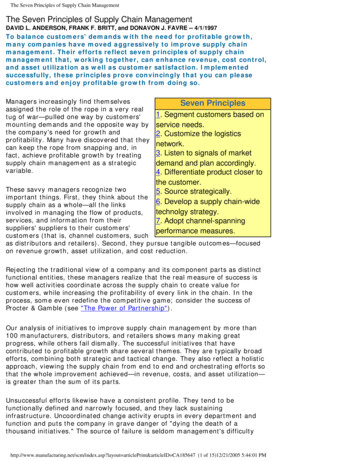
Transcription
LEARN ABOUT THE PRINCIPLESOFCATHOLIC SOCIAL TEACHING1
CONTENTSSOCIAL JUSTICE PRINCIPLESPAGEIntroduction to the Social Doctrine of the Church3No. 1The importance of prayer in our lives7No. 2The Sanctity of life and the Dignity of the human person10No. 3The Family16No. 4Community and the Common Good20No. 5Preferential option for the Poor and Vulnerable28No. 6Rights and Responsibilities32No. 7Caring for God’s Creation36No. 8Solidarity40No. 9The Dignity of Work and the Rights of Workers45No. 10 The promotion of Peace and Non-violence52No. 11 The role of Government and Subsidiarity632
INTRODUCTION: Leela Ramdeen, Chair, CCSJIn the following pages, CCSJ offers you an opportunity to reflect on some of the Church’s keysocial justice principles. In 2004 CCSJ’s Chair was fortunate to have been present at theVatican at the launch of The Compendium of the Social Doctrine of the Church. It waspublished by the then Pontifical Council for Justice and Peace at the request of Pope John PaulII. It was presented by Cardinal Renato Martino, the then President of the Pontifical Council forJustice and Peace. Inter alia, Cardinal Sodano stated in a foreword Letter that the Compendiumdeals with “questions concerning life in society” of which the compendium aspires to present “aprecise but complete overview.” The compendium, which is over 300 pages long, is dividedinto three parts, with twelve chapters, an introduction and a conclusion. It can be accessed viathefollowinglink:http://www.vatican.va/roman curia/pontifical councils/justpeace/documents/rc pc justpeace doc 20060526 compendio-dott-soc en.html“The Church’s social teaching is a rich treasure of wisdom about building a just society andliving lives of holiness amidst the challenges of modern society. Modern Catholic socialteaching has been articulated through a tradition of papal, conciliar, and Episcopal documents.The depth and richness of this tradition can be understood best through a direct reading of thesedocuments” (US Bishops).The Church has proclaimed her social doctrine since Pope Leo XIII’s encyclical, RerumNovarum (On the Condition of Labour), 1891. His encyclical on social issues condemned theterrible conditions certain employers were imposing on their workers. He urged governments toimplement labour laws and safeguards that would embrace fairer and more equitable workpractices.Since 1891 successive Popes have applied Gospel principles to social problems and have addedto and developed the Church's body of social teaching via e.g. encyclicals, exhortations and soon. Pope Pius XI (1922 to 1939) introduced the term “social justice” into Catholic teaching inhis encyclical, Studiorum Ducem (1923) – on St Thomas Aquinas, and in his encyclicalsQuadragesimo Anno (1931) and Divini Redemptoris (1937).Carol Shields Wright states: “Catholic social teaching is a branch of moral theology TheChurch's social encyclicals are a reflection upon the issues of the day using the light of faith andreason. They offer commentary on the ways to evaluate and address particular socialproblems—also using natural law principles—in the areas of politics, economics, andculture. It offers a structural way of reflecting and discerning, rooted in the Gospel and naturallaw. It is the foundation on which to form our conscience in order to evaluate the framework of3
society and is the Catholic criteria for prudential judgment and direction in developing currentpolicy-making.“With knowledge of these social principles, in combination with our faith, we will be morearmed and informed as to articulate the Catholic vision of reality, the truthful nature of thehuman person and society, to apply and integrate the social teachings in our everydayadministrative and clinical encounters, and through the virtue of charity take action within thesocial, political, and economic spheres in which we have influence “With knowledge of these social principles, in combination with our faith, we can offer aCatholic vision of reality as the foundation and criteria for decision making in confronting theissues, for, we, as the laity, are called into the public square. Moreover in integrating ourprofessional and personal lives, our faith becomes fully alive in helping to bring the Kingdomof God here and now, though not yet, through utilizing these principles in our spheres ofinfluence.” Vatican News reported that on 26 May 2018, Pope Francis addressed participants ofan international conference at the Vatican that discussed policies and lifestyles in the digitalage. “The conference was organized by the Centesimus Annus pro Pontifice Foundation. St.Pope John Paul II instituted the foundation in 1993 to promote the Church’s social doctrine “In his address, Pope Francis urged that the richness of the social teaching of the CatholicChurch be spread across the world to help build a global culture of economic justice, equalityand inclusion. He said: ‘The current difficulties and crises within the global economic systemhave an undeniable ethical dimension,” the Pope said. “They are related to a mentalityof egoism and exclusion that has effectively created a culture of waste blind to the humandignity of the most vulnerable.’ In his talk, Pope Francis lamented the growing ‘globalizationof indifference’ that places ‘manifold obstacles to the integral human development’ of manymen and women both in poor as well as developed countries. He particularly pointed to the‘urgent ethical issues associated with the global movements of migration.’Social justice is an essential element of our faith. If we are to have a personal relationship withGod; if we are to build the civilisation of love, then it is essential that we keep to the forefrontof our minds the social doctrine of our Church. As Pope Francis has said: “None of us can thinkwe are exempt from concerns for the poor and for social justice Jesus tells us what the‘protocol’ is, on which we will be judged. It is the one we read in chapter 25 of Matthew’sGospel”.Let us remind ourselves of the teachings of our Church with regard to key elements of a justsociety. This is what our Catechism tells us about Social Justice:4
“1928 Society ensures social justice when it provides the conditions that allow associations orindividuals to obtain what is their due, according to their nature and their vocation. Socialjustice is linked to the common good and the exercise of authority.1929 Social justice can be obtained only in respecting the transcendent dignity of man. Theperson represents the ultimate end of society, which is ordered to him:What is at stake is the dignity of the human person, whose defense and promotion havebeen entrusted to us by the Creator, and to whom the men and women at every momentof history are strictly and responsibly in debt.35 35 John Paul II, SRS 47.1930 Respect for the human person entails respect for the rights that flow from his dignity as acreature. These rights are prior to society and must be recognized by it. They are the basis of themoral legitimacy of every authority: by flouting them, or refusing to recognize them in itspositive legislation, a society undermines its own moral legitimacy.36 36 Cf. John XXIII, PT 65. If it doesnot respect them, authority can rely only on force or violence to obtain obedience from itssubjects. It is the Church's role to remind men of good will of these rights and to distinguishthem from unwarranted or false claims.1931 Respect for the human person proceeds by way of respect for the principle that "everyoneshould look upon his neighbor (without any exception) as 'another self,' above all bearing inmind his life and the means necessary for living it with dignity."37 37 GS 27 § 1. No legislation couldby itself do away with the fears, prejudices, and attitudes of pride and selfishness whichobstruct the establishment of truly fraternal societies. Such behavior will cease only through thecharity that finds in every man a "neighbour," a brother.1932 The duty of making oneself a neighbor to others and actively serving them becomes evenmore urgent when it involves the disadvantaged, in whatever area this may be. "As you did it toone of the least of these my brethren, you did it to me."38 38 Mt 25:40 .1943 Society ensures social justice by providing the conditions that allow associations andindividuals to obtain their due.1944 Respect for the human person considers the other "another self." It presupposes respect forthe fundamental rights that flow from the dignity intrinsic of the person.”“The Church’s social Magisterium constantly calls for the most classical forms of justice to berespected: commutative, distributive and legal justice. Ever greater importance has beengiven to social justice ” (Compendium of the Social Doctrine of the Church #201).Our Catechism (# 2411) tells us that commutative justice “regulates exchanges betweenpersons and between institutions in accordance with a strict respect for their rights.5
Commutative justice obliges strictly; it requires safeguarding property rights, paying debts, andfulfilling obligations freely contracted. Without commutative justice, no other form of justice ispossible. One distinguishes commutative justice from legal justice which concerns what thecitizen owes in fairness to the community, and from distributive justice which regulates whatthe community owes its citizens in proportion to their contributions and needs”(Catechism #2411).Distributive justice is “the virtue that regulates those actions which involve the rights that anindividual may claim from society. According to distributive justice, the state has three basicduties: to distribute the common burdens and privileges equitably; to make it possible for eachcitizen to exercise natural and acquired rights without undue hindrance; to foster mutualrelations among the citizens for living together peacefully. (www.catholicreference.net).Let us ask the God of justice and compassion to convert our hearts and minds so that we willlive as authentic disciples in His vineyard; let us resolve to build our nation/world by addressingsome of the social ills that beset us. We are living in a time when powerful forces are seeking topush religion off the public stage. We must stand up as proud Catholics—confident in ourability to build a world in which justice, peace, truth, love and freedom prevail. Don’t be afraidto speak out for justice; don’t be afraid to be a peacemaker.CCSJ hopes that this summary of key principles will be of use to you. Please join us as we seekto achieve our vision and mission: We envision a transformed national/world community whereJustice, Peace and Love prevails, as divinely ordained by God, and which ensures human rights, duties, and human dignity celebrates diversity and promotes equality promotes the common good, respect for human life, and ecology justice.The CCSJ is grounded in the Biblical concept of Social Justice and Catholic Social Teachingand is challenged by the Mission of Jesus to bring about a New World Order based on truth,love, justice, peace and freedom.Our mission is to be a fearless and unified voice to eradicate social injustice in T&T and in theworld, a voice infused with Gospel values that will awaken the social conscience of all citizensand create an empowered population so that all can be active participants in bringing about theKingdom of God here on earth. We strive to do this through Social Justice Education and Advocacypromoting people-centred development, andworking for the transformation of inequitable structures and systems.Leela Ramdeen, Episcopal Delegate for Social Justice/Chair, CCSJ6
No. 1 THE IMPORTANCE OF PRAYER IN OUR LIVES“All pastoral work, including promoting social justice and providing for the poor, must benourished by prayer, Pope Benedict XVI said. Without contemplating and internalizing God'sword daily, one risks being suffocated by too heavy a workload and one's heart risks hardeningto the wisdom of the Holy Spirit, he said. "Charity and justice are not just social action but arespiritual action realized in the light of the Holy Spirit" Charity workers must be filled with thewisdom of the Holy Spirit and not just be "good organizers who know how to do things," thepope said. It's through prayer and reflecting on God's word that people can "respond to everychallenge and situation with wisdom, understanding and fidelity to God's will."Pope Benedict said, "We must not lose ourselves to pure activism, but always let our actions bepenetrated by the light and the word of God and, that way, learn real charity." Truly servingothers means not just providing them the basic necessities, it's giving, "above all, the affectionof our heart and God's light," he said. Everything Christians do should be nourished bycontemplating God, which is especially important in a world that stresses productivity andefficiency above all else, he said (CNS 4.25.2012).Our God is a God of justice and mercy. He wants the best for us. He wants us to remain in Him.To promote Justice and Peace we need to pray and work. Our catechism tells us that “Prayer isthe raising of one’s mind and heartto God”(CCC2559).7
Archbishop Jason Gordon reminds us that “Prayer for the Christian is like water for fish topray is to realise the truth that we are in God: in Him we live and move andhave our being.” (CN Jan 13, 2019)Pope Francis (Jan 2019) reminds us that we must not just rattle off our prayers, but we mustpray from the heart. He says: ‘In prayer. we learn to see one another as brothers andsisters.In prayer, there are no rich and poor people, there are sons and daughters, sisters andbrothers. In prayer, there is no first or second class, there is brotherhood and sisterhood. It is inprayer that our hearts find the strength not to be cold and insensitive in the face of injustice.Jesus keeps knocking on our doors, the doors of our lives. He doesn’t do this by magic, withspecial effects, with flashing lights and fireworks. Jesus keeps knocking on our door in the facesof our brothers and sisters, in the faces of our neighbours, in the faces of those at our side.”St Paul tells us in 1 Thessalonians 5:17 that we must pray without ceasing. Prayer helps us tocommunicate with God; to talk to him and to draw closer to Him.It helps us to build right relationships, not only with God, but with our neighbour and withGod's Creation. By praying constantly, we ourselves can change and become more just; morelike the persons that Jesus wants us to be.8
How much time do you devote to prayer each day? Teach your children to pray. Pray as afamily. We live in a society and a world which are sorely ill. Our prayers are needed if we are tofind solutions for the many social ills that threaten to overwhelm us.And remember, Justice and Peace will not become a reality unless our prayer is linked to action.As we read in James 2:17: “If good works do not go with Faith, it is quite dead.”Pope Francis has said: “You pray for the hungry. Then you feed them. That’s how prayerworks.” And we must act to change unjust structures also. If we pray for justice and peace toprevail, what are we doing to make this a reality? May the Lord continue to inspire us to dowhat is right to build better communities and a better world.CCSJ's Prayer for Justice and PeaceO God, open our hearts to the gifts of your Holy Spirit as we seek to promote Your reign here inTrinidad and Tobago. Help us to become a nation where peace is built with justice and justice isguided by love, love of God and love of neighbour. Help us to rediscover and live our faith sothat our concern for social justice will be transformed into constructive action as we spread theGood News in this land. We ask you, O God, to guide and bless all our efforts. Inspire us as youdid the Prophets of old with courage, imagination, and creativity. This we pray in Jesus' name.Amen.9
No. 2 THE SANCTITY OF LIFEANDTHE DIGNITY OF THE HUMAN PERSONHuman life is a gift from God. Jeremiah 1:5 tells us: “Before I formed you in the womb, I knewyou; before you were born I sanctified you.”Our Catechism tells us: “Human life must be respected and protected absolutely from themoment of conception. From the first moment of his existence, a human being must berecognized as having the rights of a person – among which is the inviolable right of everyinnocent being to life,”#2270.We are all made in the image and likeness of God. Pope St John Paul II reminded us that:“Human persons are willed by God; they are imprinted with God's image. Their dignity doesnot come from the work they do, but from the persons they are The new evangelization calls forfollowers of Christ who are unconditionally pro-life: who will acclaim, celebrate and serve the Gospel oflife in every situation. A sign of hope is the increasing recognition that the dignity of human life mustnever be taken away, even in the case of someone who has done great evil.”The sanctity of life and the dignity of each human being is the foundation of a moral vision forsociety. This belief is the foundation of all the principles of our Church’s social teaching.The US Bishops remind us that our Church teaches that “The life and dignity of every personmust be respected and protected at every stage and in every condition. We believe that everyperson is precious, that people are more important than things, and that the measure of everyinstitution is whether it threatens or enhances the life and dignity of the human person.”10
To be pro-life is to be pro-all life. As Pope Francis states: “Even the weakest and mostvulnerable, the sick, the old, the unborn and the poor, are masterpieces of God's creation, madein his own image, destined to live forever, and deserving of the utmost reverence and respect.”The dignity that I have comes from God. Nobody can take that away from me. It doesn't matterwhether I'm rich or poor, whether I live in Beetham or Westmoorings, it's a permanent part ofmy being. When you think of dignity, you have to think of your duties to God, your neighbourand also to yourself. The permanent character of my dignity is essentially linked to the dignityof others. We are connected. And our dignity is connected. If their dignity is trampled upon,mine becomes tarnished.Although human dignity is a permanent part of our character, given by God, it is also a goal, anachievement. This means that we must constantly be seeking to realize our human dignity byhow we live our lives.We must promote human life which is under attack daily. Many don't have basic amenities orwhat is necessary to have a decent quality of life. For example: water, food, clothing, housing,appropriate health care, electricity, education, decent roads, employment. Authentic integralhuman development is about the whole person and every person. The words of a Vatican IIdocument, Gaudium et Spes, The Joys and Hopes, are worth noting. The document states:“Whatever is opposed to life itself, such as any type of murder, genocide, abortion, euthanasia,or willful self-destruction, whatever violates the integrity of the human person, such asmutilation, torments inflicted on body or mind, attempts to coerce the will itself; whateverinsults human dignity, such as subhuman living conditions, arbitrary imprisonment,deportation, slavery, prostitution, the selling of women and children; as well as disgracefulworking conditions, where people are treated as mere instruments of gain rather than as free11
and responsible persons; all these things and others like them are infamies indeed. They poisonhuman society, and they do more harm to those who practise them than to those who suffer fromthe injury. Moreover, they are a supreme dishonour to the Creator”.If TT is concerned to promote the sanctity of life and the dignity of each person, then we mustwork with our Government to build the common good; to create conditions to allow people torealise their potential so that they can flourish. We must become advocates for those whosedignity is being trampled upon daily, e.g. let’s be a voice for the voiceless unborn. Euthanasiaand assisted suicide are now legal in a number of countries. And while 142 countries haveabolished the death penalty in law or practice, our Church continues to call for global abolitionand in August 2018, Pope Francis revised our Catechism to make it clear that, as Catholics, weoppose the death penalty. Para 2267 now reads: “Recourse to the death penalty on the part oflegitimate authority, following a fair trial, was long considered an appropriate response to thegravity of certain crimes and an acceptable, albeit extreme, means of safeguarding the commongood.Today, however, there is an increasing awareness that the dignity of the person is not lost evenafter the commission of very serious crimes. In addition, a new understanding has emerged ofthe significance of penal sanctions imposed by the state. Lastly, more effective systems ofdetention have been developed, which ensure the due protection of citizens but, at the sametime, do not definitively deprive the guilty of the possibility of redemption.Consequently, the Church teaches, in the light of the Gospel, that “the death penalty isinadmissible because it is an attack on the inviolability and dignity of the person”,[1] and sheworks with determination for its abolition worldwide. Pope St John Paul II warned against the“alarming symptoms of the ‘culture of death’ which sees the growing number of elderly and12
disabled people as intolerable and too burdensome.” Let us ask Our Lord, the giver of life, tohelp us to value all life and to promote the dignity of each human person.”We have a duty to help others to do good and avoid evil. Therefore, we must not turn our backs on thosewho have committed crimes. As Pope Francis says: “Every life is sacred, every human person isendowed with an inalienable dignity, and society can only benefit from the rehabilitation of thoseconvicted of crimes.”Let us not condemn others but journey with them as we seek to encourage everyone to live lives ofholiness. As Pope Benedict XVI said: “The Catholic community must offer support to those women whomay find it difficult to accept a child, above all when they are isolated from their family and friends.Likewise, the community should be open to welcome back all who repent of having participated in thegrave sin of abortion, and should guide them with pastoral charity to accept the grace of forgiveness, theneed for penance, and the joy of entering once more into the new life of Christ.”In July 2002 our Archdiocese staged an interfaith march to celebrate the dignity of life from thefirst moment of conception. Before the march, the then Archbishop, Edward Gilbert told themedia that it was necessary to put all life’s challenges into a proper context.“The secret in facing the challenge is to understand the context. Poor family life, an inadequateunderstanding of the meaning of sexuality, gender-conditioned relationships between the sexes,poverty, little or no value formation, alcohol abuse, the drug culture, individualism are all partof the context,” he said.“The church understands that, even in the best of circumstances, life can be extremelychallenging for many different reasons,” but, said the archbishop, “the teaching of manyreligious traditions, including the Catholic Church, is quite clear – abortion is not an acceptableanswer to the challenge” (www.ipsnews.net).And as we reach out to assist pregnant mothers and their families, as well as those who givebirth to their children, let us also lobby for, for example: Better health care services for all; Thereduction of poverty and social exclusion; More informed educational programmes/counselling13
facilities in educational institutions and in local communities about issues such as family life,values, life skills, responsible parenthood, natural family panning methods; Well publicisedinformation about centres/organisations where pregnant women in need can go for help; Theavailability of workplace crèches and community nurseries; and Better employer practice inrelation to maternity and paternity leave.In promoting the dignity of the human person, we need to examine practices and procedures inour country/world that stand as obstacles to this goal. In Jun 2016, organised a symposium, incollaboration with the Faculty of Law, at the St Augustine Campus of UWI. It wastitled: Understanding and Promoting Restorative Justice. Archbishop Jason Gordon wasone of the speakers. He said: “The penal system as it exists today, exists not so much forjustice but, I would dare say, for retribution of some form or fashion the system was setup long ago where the form of justice was that if you did something, you took somet hingthat belonged to me, you lost your freedom and your liberty and while you were parkedaway being warehoused, somehow I was feeling better for myself because you lost yourdignity or your liberty or your life or your name it is kind of a preventative, measure.”He said that scenario had not worked well in the existing justice system.“There are more people being warehoused in prisons around the world now than everbefore and the truth in our circumstance is that an 18- or 19-year-old commits a crime,goes through the legal system, goes into remand, and in remand what happens?“He now goes from a petty criminal, graduates with a degree, comes out with a Masters(degree) depending on how long he spends on the remand and now comes out with acircle of friends who have taught him how to do real criminal activity and, therefore, ithas not helped society by putting this person in remand.”He said there were many people who had spent more time in remand than they shouldhave. “And so, how is justice being served by this system that we are using now?. Now,we are masters of our own house and we have to find new traditions, new ways of dealingwith things.”Archbishop Jason Gordon referred to the concept of Restorative Justice (RJ). He said: “Inour current system the focus is on retribution. RJ is about restoring relationships throughtruth, forgiveness, paying a price and thus establishing justice One of RJ’s mainproponents, Howard Zehr, says, ‘RJ is a process to involve, to the extent possible, thosewho have a stake in a specific offence and to collectively identify and address harms,needs and obligations, in order to heal and put things as right as possible.’”14
Over the years, our Popes have spoken out and have produced encyclicals etc. that highlight theChurch’s concern to promote the sanctity of life and the dignity of the human person e.g. inJune 2018, Pope Francis said: “Life from conception, childhood, adolescence, adulthood, oldage, as well in those moments when it is fragile and sick, wounded, offended, demoralized,marginalized and those cast aside is always human life When we surrender children todeprivation, the poor to hunger, the persecuted to war, the elderly to abandonment, we are notdoing our own work but rather the dirty work of death. And where does the 'dirty work' of deathcome from? It comes from sin.” Here are a few other helpful quotations:“When we fail to acknowledge as part of reality the worth of a poor person, a human embryo, aperson with disabilities – to offer just a few examples – it becomes difficult to hear the cry ofnature itself; everything is connected. (Pope Francis, On Care for Our Common Home [LaudatoSi'], no. 117)“The dignity of the individual and the demands of justice require, particularly today, thateconomic choices do not cause disparities in wealth to increase in an excessive and morallyunacceptable manner.” (Pope Benedict XVI, Charity in Truth [Caritas in Veritate], no. 32)“Human persons are willed by God; they are imprinted with God's image. Their dignity doesnot come from the work they do, but from the persons they are.” (St. John Paul II, On theHundredth Year [Centesimus annus], no. 11)“There exist also sinful inequalities that affect millions of men and women. These are in opencontradiction of the Gospel: Their equal dignity as persons demands that we strive for fairer andmore humane conditions. Excessive economic and social disparity between individualsand peoples of the one human race is a source of scandal and militates against social justice,equity, human dignity, as well as social and international peace.” (Catechism of the CatholicChurch. . . no. 1938)“ if the family is the sanctuary of life, the place where life is conceived and cared for, it is ahorrendous contradiction when it becomes a place where life is rejected and destroyed Thefamily protects human life in all its stages, including its last” (83). Pope Francis, ApostolicExhortation, ‘The Joy of Love’.As we promote the sanctity of life and the dignity of the human person, let us resolve never togive up in our efforts to reject the culture of death that threatens to overwhelm us.15
No. 3THE FAMILYOne of the Church’s key social justice principles is The Family. The 1983 Catholic Charter ofthe Rights of the Family defines family as “a community of love and solidarity, which isuniquely suited to teach and transmit cultural, ethical, social, spiritual and religious values,essential for the development and well-being of its own members and of society”.In his Independence Day address to the nation on 31 Aug 1962, Dr Eric Williams stated clearlythat “the strength of the Nation depends on the strength of its citizens.” Strong families buildstrong communities which in turn will build a strong nation.St Pope John Paul II reminded us years ago that: “The future of humanity passes by way of thefamily.” He referred to the family the “first and vital cell of society.” It is in the family that ouryoung people first learn moral and spiritual values and virtues, which give meaning to theirlives. It is in the family that we will develop a culture of life; a spirit of nation-building.And see his apostolic exhort
his encyclical, Studiorum Ducem (1923) - on St Thomas Aquinas, and in his encyclicals Quadragesimo Anno (1931) and Divini Redemptoris (1937). Carol Shields Wright states: "Catholic social teaching is a branch of moral theology The Church's social encyclicals are a reflection upon the issues of the day using the light of faith and











